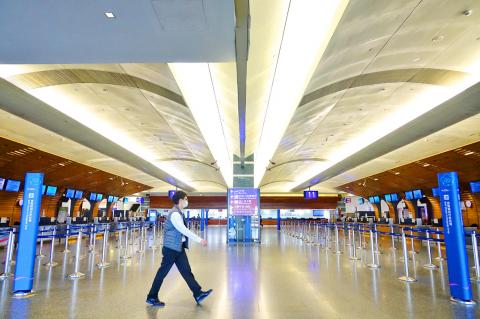The Ministry of Transportation and Communications (MOTC) yesterday said that it plans to upgrade the travel industry amid a COVID-19 epidemic by offering professional training subsidies to people working in the sector.
The spread of the disease from China to other nations has dealt a severe blow to Taiwan’s tourism industry, which prompted the ministry to budget NT$4.4 billion (US$146.24 million) to help business operators weather industry headwinds, it said.
The ministry is compensating travel agents for the financial losses they sustained for cutting short Chinese visitors’ tours in Taiwan, and suspending trips to China, Hong Kong and Macau in compliance with the government’s disease-prevention policy.

Photo: Liu Hsin-de, Taipei Times
The ministry yesterday announced that it plans to use NT$800 million from the budget to offer professional training to people working in the tourism industry, including employees of travel agencies as well as tour guides, tour bus drivers and taxi drivers.
According to the plan, NT$500 million would be used to train travel industry workers, while NT$300 million would be spent on training people working in transportation businesses.
The two programs would be overseen by the Tourism Bureau and the Directorate-General of Highways respectively, the ministry said.
The travel industry and transportation businesses are facing unprecedented challenges due to the COVID-19 epidemic, Deputy Minister of Transportation and Communications Wang Kwo-tsai (王國材) said.
They might be going through a crisis, but it might turn out to be an opportunity to equip themselves with more professional knowledge, he said.
The bureau would entrust business associations in the travel industry and travel service workers’ unions to host training seminars for their members, Wang added.
Each seminar must limit its expenses to NT$3 million, which must also cover an NT$158 hourly subsidy per trainee and other administrative fees, Wang said.
Each trainee may attend up to 120 hours of seminars per month, he said.
Trainees would learn to use digital technology to market their services and change their business models, Wang said.
Training organizers are encouraged to host seminars in different localities, for which they would have to lease tour buses.
Trainees, on the other hand, would have to stay in hotels and could shop in tourist destinations, he said, adding that this would help revive tourism.
Employers would receive training subsides if they agree to retain their employees instead of furloughing them, he added.
Tour guides and taxi drivers who work independently would receive subsidies directly from the bureau, Wang said.
Minister of Transportation and Communications Lin Chia-lung (林佳龍) has agreed to increase subsidies for professional training if demand exceeds the estimates, Wang said.
The ministry would also invite a group of experts to conduct a comprehensive inspection of the nation’s tourism industry and tourist destinations, and propose projects to enhance the nation’s travel service quality and upgrade the facilities in the destinations, Wang said.
The projects would be funded by a ministry program to upgrade and transform the tourism industry, which would cost NT$30 billion and would be submitted to the Executive Yuan in June, he said.
Meanwhile, the ministry has also budgeted NT$4.863 billion to help the nation’s airlines, as they have been forced to cancel flights or suspend flight services to certain regions due to the government’s disease-prevention policy and a decline in passengers, it said.

Taiwanese can file complaints with the Tourism Administration to report travel agencies if their activities caused termination of a person’s citizenship, Mainland Affairs Council Minister Chiu Chui-cheng (邱垂正) said yesterday, after a podcaster highlighted a case in which a person’s citizenship was canceled for receiving a single-use Chinese passport to enter Russia. The council is aware of incidents in which people who signed up through Chinese travel agencies for tours of Russia were told they could obtain Russian visas and fast-track border clearance, Chiu told reporters on the sidelines of an event in Taipei. However, the travel agencies actually applied

Japanese footwear brand Onitsuka Tiger today issued a public apology and said it has suspended an employee amid allegations that the staff member discriminated against a Vietnamese customer at its Taipei 101 store. Posting on the social media platform Threads yesterday, a user said that an employee at the store said that “those shoes are very expensive” when her friend, who is a migrant worker from Vietnam, asked for assistance. The employee then ignored her until she asked again, to which she replied: "We don't have a size 37." The post had amassed nearly 26,000 likes and 916 comments as of this

New measures aimed at making Taiwan more attractive to foreign professionals came into effect this month, the National Development Council said yesterday. Among the changes, international students at Taiwanese universities would be able to work in Taiwan without a work permit in the two years after they graduate, explainer materials provided by the council said. In addition, foreign nationals who graduated from one of the world’s top 200 universities within the past five years can also apply for a two-year open work permit. Previously, those graduates would have needed to apply for a work permit using point-based criteria or have a Taiwanese company

The Shilin District Prosecutors’ Office yesterday indicted two Taiwanese and issued a wanted notice for Pete Liu (劉作虎), founder of Shenzhen-based smartphone manufacturer OnePlus Technology Co (萬普拉斯科技), for allegedly contravening the Act Governing Relations Between the People of the Taiwan Area and the Mainland Area (臺灣地區與大陸地區人民關係條例) by poaching 70 engineers in Taiwan. Liu allegedly traveled to Taiwan at the end of 2014 and met with a Taiwanese man surnamed Lin (林) to discuss establishing a mobile software research and development (R&D) team in Taiwan, prosecutors said. Without approval from the government, Lin, following Liu’s instructions, recruited more than 70 software